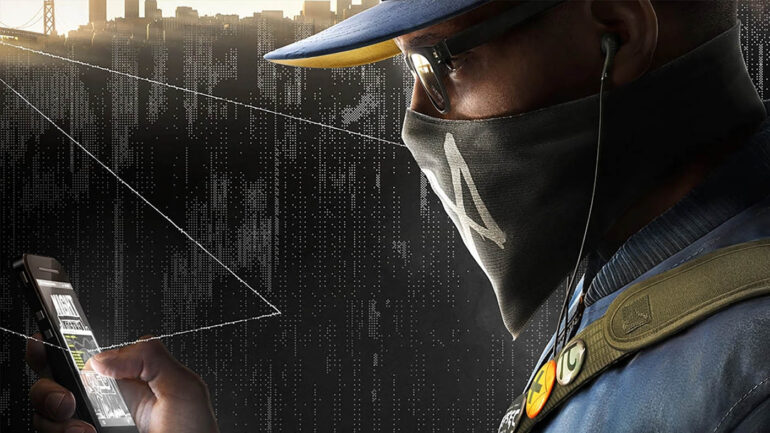
Cyber security is the fastest growing area of information technology. With the rise in new technologies presenting a risk to local and global security, it’s not hard to see how. Chisholm has responded with a course specifically designed in collaboration with industry partners. The Certificate IV in Cyber Security (22334 VIC) is a high tech and high-speed program that will prepare you with the skills and knowledge required to be job ready in a rapidly growing sector. Take a look at the courses here.
Computer hacking is a broad and complex art that can be traced back to the earliest forms of telecommunications tampering in the 1950s, but its place in mainstream culture conjures a very specific image of tech prodigies wearing trench coats and sunglasses indoors and rapidly prodding at keys as lines of code fill a screen.
These sneaky geeks are most often seen trying to break into computer systems to get information, open locked doors, siphon bank accounts or thwart corporate conspiracies, and so their skills translate incredibly well to the world of immersive video games. Hacking has a huge place in a multitude of the games we play, typically of the action or RPG variety, where players can hone a skillset that allows them to circumvent tricky situations in new ways.
With that in mind, we’ve taken a look at some of the best examples of hacking in video games – the ones that go a long way to make players truly feel like they could be that person in a dimly-lit room, coat and sunnies on, surrounded by empty energy drink cans while they steal the passwords of everyone who’s ever logged into Neopets.
Check out our top picks below:
Deus Ex: Human Revolution
It’s always going to be hard to talk about games featuring hacking and high-tech espionage without mentioning the Deus Ex series, and 2011’s Human Revolution is a great example of what makes the series’ gameplay loop so addictive. Nearly every situation in Human Revolution can be solved in a multitude of ways, so something as simple as a locked door can be approached by players differently – maybe you’ll look for a passcode scrawled on a sticky note somewhere, maybe you’ll brute force it, or maybe you’ll don your futuristic hacker shades and crack the code yourself.
Many, many things in Deus Ex: Human Revolution can be hacked through computers in-game, from security doors to drones and turrets, and the minigame involved in doing so is a ton of fun in and of itself. The game presents players with a series of nodes to capture in order to reach the network’s registry before its security sub-routines discover them and boot them from the system. It looks complex, but plays sort of like a quick-fire tower defence game where it’s important to fortify captured nodes and decide whether you risk veering off to collect extra bonuses or go straight for the hack. It’s a great example of a hacking minigame that’s almost more fun than anything else in the game.
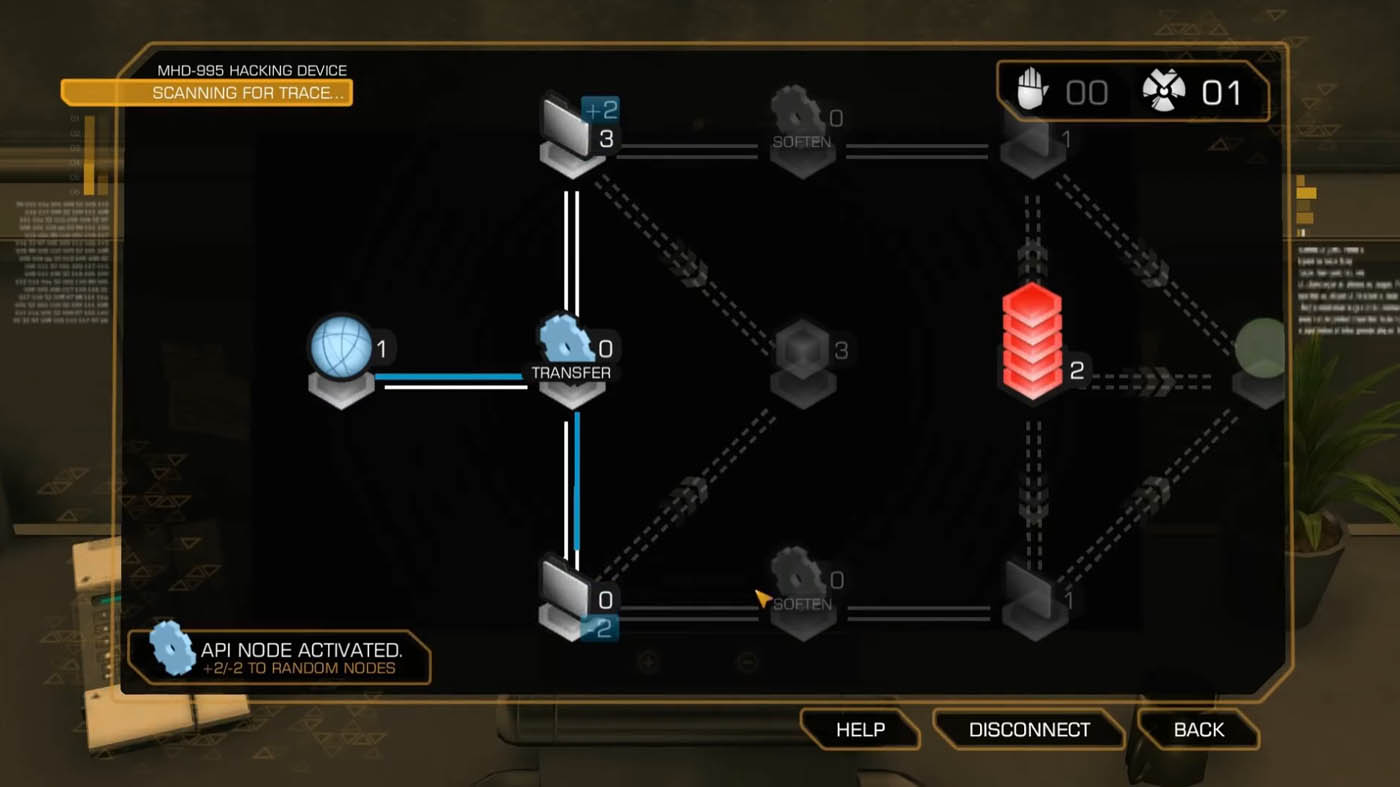
Quadrilateral Cowboy
One of the lesser-known games on this list but easily one of the most unique and engaging hacking experiences, Quadrilateral Cowboy casts players as a hacker named Poncho in an 80s-inspired world of clunky computer systems and cassette-based tech. Out of everything here it’s probably the closest thing to a “realistic” hacking experience with its command-line prompts and immersive world where your toolkit is a portable computer that you need to lug around with you to jack into other devices.
The neat thing about Quadrilateral Cowboy, aside from its oddly-charming blocky aesthetic and off-kilter vibes, is that any initial fear factor players might have when asked to understand and perform actual command prompts quickly dissipates when they realise how natural and practical its systems are to use. It’s a really effective way of making players feel like legitimate hackers even if they’ve never touched a line of code in their lives.
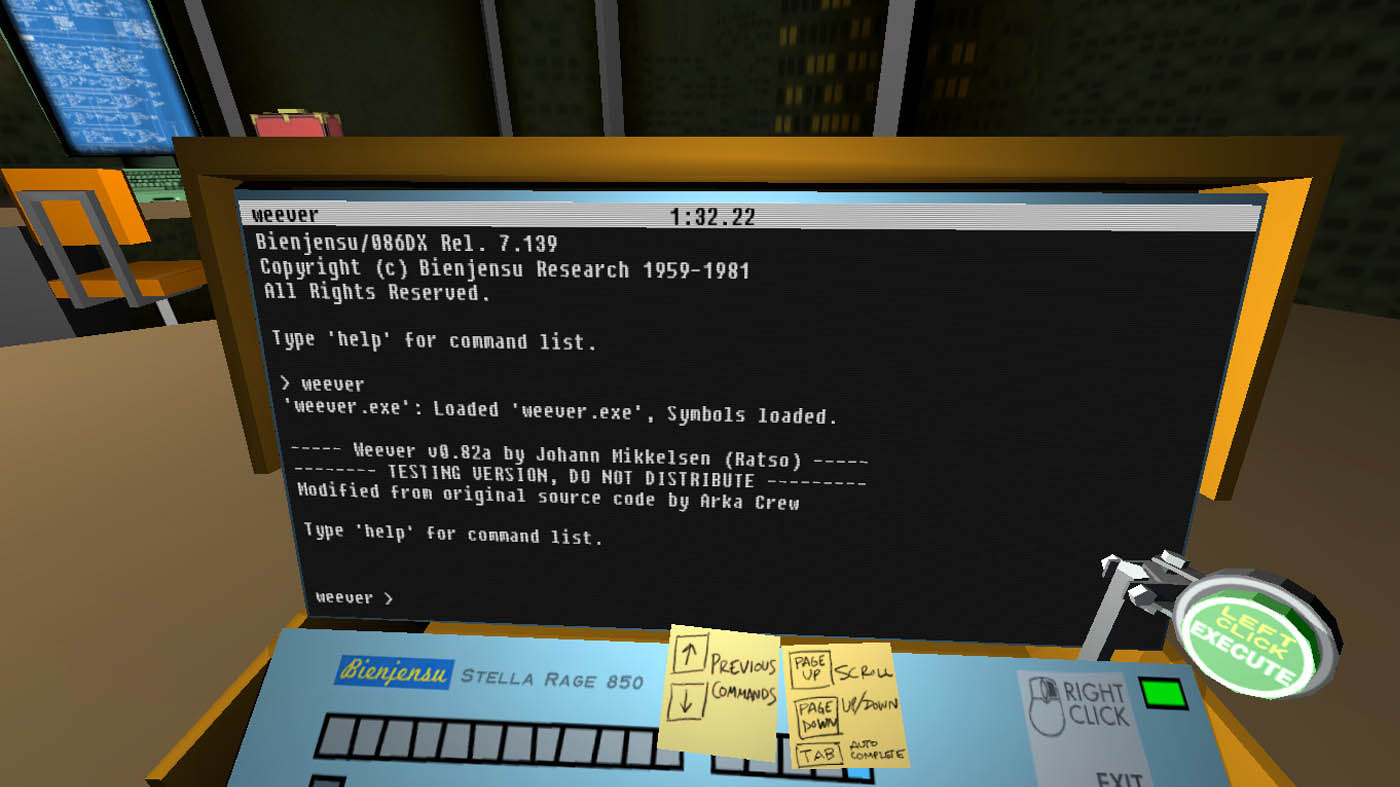
Bioshock
Bioshock might come across as one of the stranger examples in this list, given its trapped-in-time art deco setting means that there’s not exactly any high-tech computer equipment around. That didn’t stop Irrational Games from tapping into their pedigree with System Shock though and including some form of a hacking minigame. The more analogue nature of technology in Bioshock’s Rapture extends to its hacking minigame, which sees players uncover and arrange a series of pipe joints in order to direct the flow of water from one point to another. It’s a fun, and surprisingly addictive, puzzle in a race against the clock.
The best thing about hacking in Bioshock is that it affords players another playstyle opportunity that benefits them whether they’ve chosen to play the game with stealth or brute force in mind. You can hack obvious things like doors and safes, or cameras and turrets to turn on enemies, but also devices like vending machines and health stations to lower their costs. Health points can even be turned on enemies so that they take damage when attempting to use them! Despite the rudimentary tech, hacking is absolutely an invaluable part of the Bioshock experience.
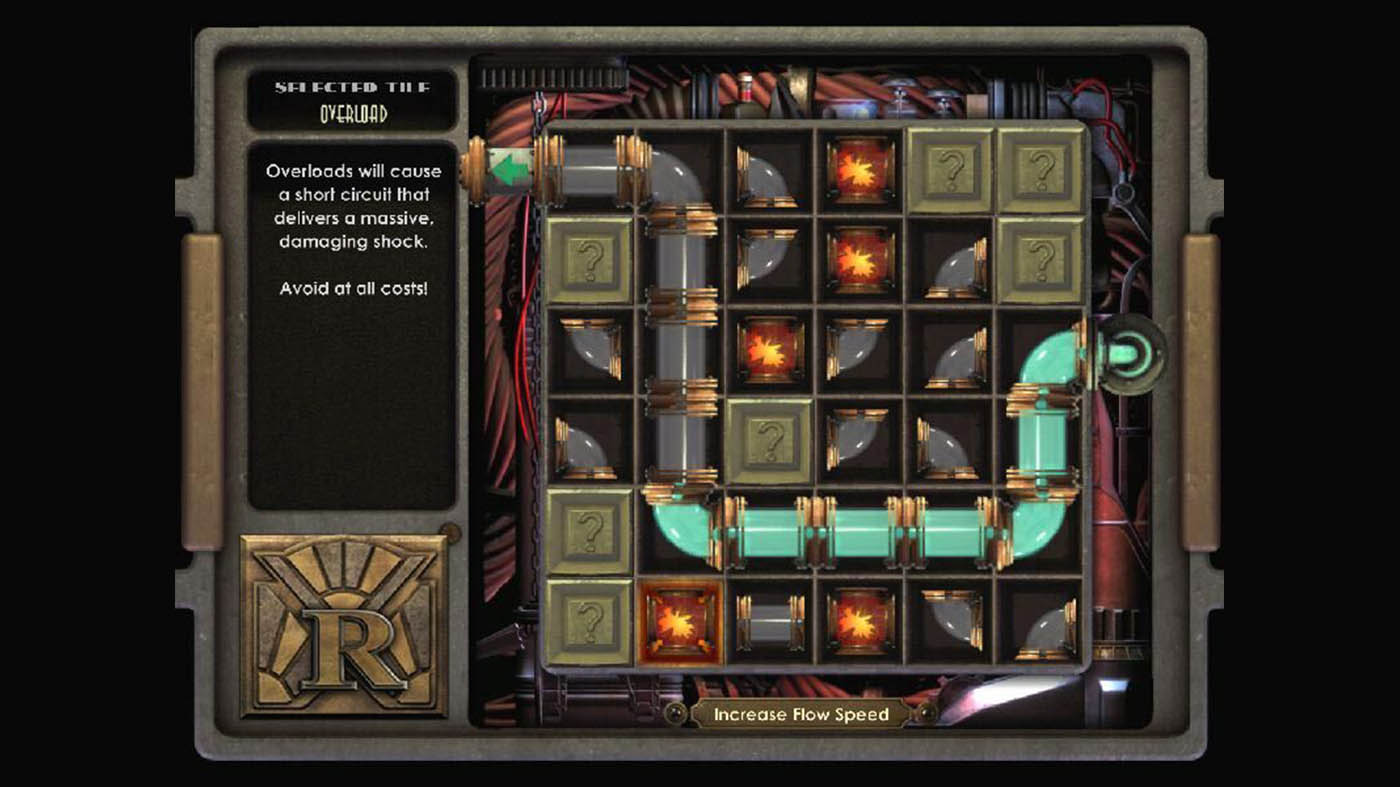
Cyberpunk 2077
In a game about cybernetic implants in a futuristic dystopia it’s no surprise that much of Cyberpunk 2077 is a cautionary tale about the added vulnerability of human beings having such an intrinsic connection to tech. As V, players have a multitude of options for hacking access points, devices and people as they make their way through CD Projekt Red’s open world epic.
Quickhacks in CP2077 present players with options to augment their playstyle, allowing them to access and sabotage devices in their environment as well as turn enemies’ cybernetic implants against them. From something as simple as pinging an electronic object to draw a foe’s attention to burning out their synapses (ouch!), hacking will often get you a lot further than simply running into a room, guns blazing. V will also need to hack themselves at your local ripperdoc’s to upgrade their on-board RAM and further their implants’ abilities.
Hacking is a beautiful thing in Cyberpunk 2077, an essential component that means that nearly every living or inanimate thing in its world has a hidden potential – if you’ve got the tech to crack it.

Observer
Similar to Cyberpunk 2077, Observer’s dystopian sci-fi setting opens up a lot of discussion around the potential dangers in the fusion of humans and machines. As a detective in a gritty and grimy Krakow in 2084, players are tasked with tracking down their estranged son in a derelict apartment block by interrogating its residents and searching for clues. It’s the only game in this list that leans more on a psychological thriller aesthetic than espionage action, a feat it achieves partially through Detective Lazarski’s ability to “hack” into people’s minds to retrieve information and memories through their brain implants.
The more narrative-heavy experience won’t have you engaging in addictive hacking games, but its adventure-style gameplay still uses hacking as a core component to obtaining information to progress and unlock secrets that its shady characters don’t necessarily want you to know.

Watch Dogs
If there was ever a video game series that screamed the phrase Hack The World, it’s Watch Dogs. Since the first title, Ubisoft’s open world action games have allowed players to live out the hacker fantasy in bombastic and ridiculous ways. Sure, it’s one thing to tap into a facility’s security cameras to observe enemies, but how about remotely hacking their phones to explode in their pockets? Or hacking a passing car’s on-board AI to cause it to swerve into traffic? By the time the most recent entry, Watch Dogs Legion, rolled around players had so many options for hacking that some missions could almost be completed entirely without even entering the building or area they took place in.
Famously, the series also let players snoop into the phones of any passer-by to see details of their personal lives, a mechanic that would eventually be used to canvas potential recruits in Legion. Out of everything that players can do in the games it’s probably the one that feels the most like a cautionary tale for the future of online devices and identities…
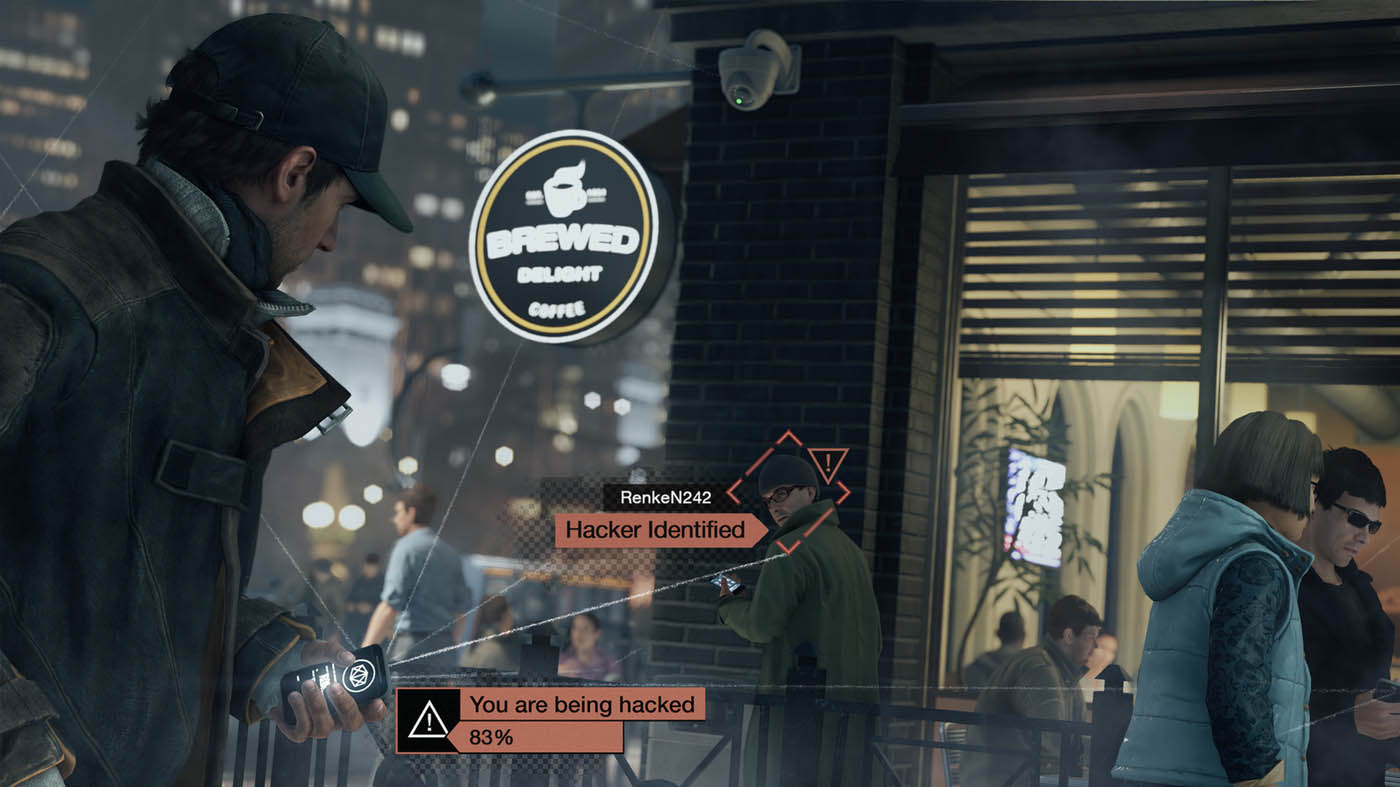
Which brings us to the real world. The potential of technology for our daily lives continues to expand at an astronomical rate, and the more online we become, the greater the risk to our personal and global security. That means that cyber security is more important than ever, and for many that means there’s a ton of potential in a career path within this crucial industry.
Melbourne’s Chisholm TAFE understands the value of education in one of the fastest-growing areas in technology, and so it’s offering courses for people to chase their calling in Cyber Security.
The Certificate IV in Cyber Security (22334VIC) is a Free TAFE for Priority Course (see eligibility here) that offers the opportunity to learn network security fundamentals, incident response plans, ethics and privacy within an ICT environment, analyse data and present research. The course provides for a range of possibilities within the Information Technology sector, including penetration testing, human hacking, network and IT security. The skills acquired will provide a multitude of career options worldwide.
The course is also part of a unique pathway to the Advanced Diploma of Cyber Security (22445VIC), which provides graduates with the knowledge and skills that will equip them to provide a comprehensive set of technical services such as:
• performing a security risk assessment for an organisation
• implementing best practice for identity management
• evaluating an organisation’s compliance with relevant cyber security standards, laws and codes of practice
• evaluating and implementing security protection devices and software
• managing a cyber security environment
• assessing and securing cloud services
• performing digital forensic investigations on workstations and mobile devices.
If you’d like to know more about Chisholm’s course offerings in Cyber Security, head to the web page here.


